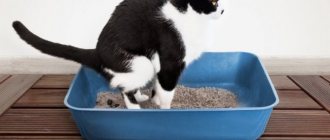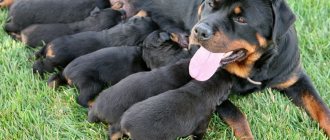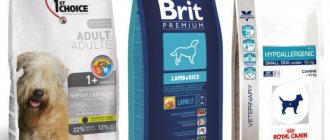It is generally accepted that a rumbling stomach is a “warning” from the body about the need to have a hearty lunch. At least in the case of people. What about pets? After all, rumbling in a dog’s stomach is also a common phenomenon! Moreover, in some animals it can be so strong that owners naturally have doubts about its safety. So why does this phenomenon occur, does it pose a potential threat to the health of pets? Let's find out!
What causes the grumbling?
Bowel sounds are completely normal for all mammals. They are associated with the processes of digestion and peristalsis, that is, with episodes of intestinal contraction . The sounds made when air and gas bubbles move through the gastrointestinal tract are also called “borborygmi”. The word is originally ancient Greek, now considered English... but has no generally accepted translation. It is believed that this term can be loosely translated as "loud grumbling" or something like that.
Just like with humans, purring can occur when your dog is hungry . It is also possible that it has a psychogenic origin: if a dog smells the unforgettable aroma of barbecue, its stomach may immediately begin to grumble, prompting your pet to try to beg or steal a piece of the desired delicacy. Very often it gurgles in the stomach of dogs who are in a hurry when eating: along with food, they swallow a lot of air . As it moves “out”, gurgling and seething sounds arise.
What to do? If you think your dog is purring for this reason, try feeding him more often, but in smaller portions. It may also help to raise the bowl higher to prevent the animal from tilting its head when eating.
Should I worry?
In most cases, grumbling does not pose any threat, but sometimes loud sounds emanating from the intestines are a reason to be wary. They may be a sign of some serious pathologies of the gastrointestinal tract. Again, veterinary practice shows that most often the stomach grumbles in animals that simply ate something “wrong.” Often this phenomenon is a consequence of a sudden change in diet, including the introduction of new food into the diet . Sometimes borborygmi is a harbinger of indigestion, and it would be better if you had the opportunity to properly walk your pet...
If loud stomach noises are accompanied by lethargy, constipation, diarrhea or vomiting, it is advisable to put your four-legged dog on a daily fasting diet (do not limit water). If his condition remains unchanged, you need to contact a veterinarian. Of course, if the dog becomes noticeably worse, you should not wait for the expiration of the daily period - the sooner you take your pet to the clinic, the better for his health. As a rule, when dealing with complaints of “roars” from the abdomen, veterinarians resort to fluoroscopy. This is necessary to quickly confirm or refute the presence of foreign bodies in the digestive organs. Now let's look at some of the reasons in more detail.
How to help a dog
If a dog’s stomach is seething, the natural desire of any owner is to help the pet. But you don’t need to immediately rush to feed him activated carbon, massage his stomach or put him on a starvation diet. First, you should take the dog to the veterinarian, evaluate the condition, and only then begin correction:
- If he is not eating properly, adjust his diet.
- If he eats too quickly, buy or make a special bowl.
- If you overeat, reduce portions.
- If he has worms, deworm with the prescribed tablets.
- If there is poisoning, help the veterinarian flush the stomach and put on a drip, and then feed little by little and exclusively recommended food until everything returns to normal.
- If there is dysbacteriosis, then add special drugs to the food. You can feed the dog tablets, you can grind them into powder and pour them into food.
- If there is an intestinal infection, then pay for treatment at the veterinary clinic and, if necessary, adjust further diet. Most often, two weeks of gentle nutrition, five to six times a day, are required.
- If you have an allergy, completely exclude the source of the allergen. To do this, you may need to change the diet or teach the dog the “fu” command, which will prevent him from picking up on the street. And, of course, agree with relatives and friends so that they do not feed the patient.
- If it is an erosive disease, adjust the diet. Either special food for patients or a complete revision of the diet is used. The meat is exclusively dietary, porridges are exclusively made with water and have a liquid consistency, vegetables should be boiled and not served raw or more or less whole. More water, reduce fermented milk products to a minimum. Avoid boiled eggs altogether.
- If there is a tumor, then either put him on a diet or pay for an operation during which the tumor will be cut out. Afterwards you will need a gentle regimen, a change of bandages and a course of anti-inflammatory medications.
As a result of treatment, the dog will feel better. Mobility and energy will return, and with them optimism and a willingness to play with the owner. The main thing is not to delay, since advanced diseases are always more difficult to treat.
The relationship between grumbling and gluttony
As we have already said, grumbling is often a consequence of overeating or a sudden change in diet. To prevent this from happening, you should always follow the simplest rule - all new foods are introduced into the diet gradually, in small portions. In ideal cases, small amounts of new food are gradually mixed with old food. This is done for several days until the new food completely replaces the “outdated” diet. This is long and tedious, but this approach will save the dog’s digestive system from many troubles.
Many dogs, unfortunately, do not belong to the category of “refined gourmets” by nature. For them, eating too much in a garbage dump is a completely natural thing. If your pet “successfully” visited a garbage heap or managed to “clean” the set table while the owners were distracted, he will probably overeat. According to veterinary nutritionists and biologists, the digestive system of all canines is designed by nature for frequent meals in small portions. If the dog eats to his fill, his gastrointestinal tract simply cannot cope with such a load. Hence the grumbling, diarrhea with flatulence, and other negative aspects of overeating.
Where do gases come from in the intestines of animals?
A completely healthy dog has only beneficial bacteria in its intestines, without which the process of digesting food is impossible. They extract beneficial substances from food that are absorbed into the blood. Another task of these bacteria is to process leftover food to the required consistency so that the “stool” is normal and the pet can empty its intestines without problems. A natural sign of healthy activity of beneficial bacteria is gas formation. Excessive gases are released naturally - the animal farts. Sometimes belching is also possible. If this happens infrequently and is associated with overeating and is not accompanied by vomiting, loose stool with mucus, or other signs of illness, do not worry. Simply remove anything from your dog's diet that causes your dog's stomach to growl and pass gas.
Remove anything that causes rumbling from your diet.
If a little Spitz’s stomach is constantly seething, only an experienced veterinarian can tell you what to do. The animal must undergo a comprehensive examination to determine the causes. The most dangerous condition, in which there is rumbling in the stomach and gases are released, is flatulence.
Attention ! Immediately a couple of days before giving birth, bitches may experience similar problems, as natural bowel cleansing occurs.
Why does a Spitz’s stomach rumble so much, and what is flatulence?
If your pet has digestive problems, he may refuse to eat in the morning and evening, and may also become sad. All this may be a sign of flatulence - a condition in which an excess accumulation of gases forms in the stomach and intestines.
It is necessary to understand that this is not an independent disease, but only one of the clinical symptoms of deterioration in the functioning of the digestive system. Excess gas most often occurs in the small intestine and is accompanied by the following symptoms:
- bloating;
- the appearance of diarrhea or constipation;
- pain when touching the stomach;
- poor appetite or its complete absence.
Sick pet This clinical picture is not often observed in Spitz dogs, but do not underestimate the seriousness of the situation, because it can mean the development of dangerous conditions for the pet’s health. Be sure to contact a veterinary clinic when the first signs of flatulence appear to diagnose the causes of this condition.
Rumbling and water
On a hot summer day or just in a stuffy room, water is the only way for a dog to somehow “regulate” the body’s thermoregulation. This is especially true for dogs of brachycephalic breeds (bulldogs, pugs, etc.), which are not okay with this anyway. In general, your pet can drink a lot of water in one sitting. So, if a lot of fluid has entered the gastrointestinal tract, you can easily hear the gurgling and rumbling of gases displaced by water from the intestines. Of course, there's nothing wrong with that. Moreover, if you conduct such an “experiment” on yourself, you will hear the same thing.
But in cases where the noise after drinking large quantities of water is accompanied by less harmless symptoms, it makes sense to pay a visit to the veterinarian. Thus, stomach rumbling and vomiting immediately after eating liquid food or water may indicate megaesophagus /esophagitis. These diseases lead to quite unpleasant consequences, so an examination by a specialist will definitely not hurt.
Causes of abdominal noises
Rumbling sounds are associated with improper bowel function. This occurs with excessive irritation of the mucous membrane, muscle activity, and accumulation of gases. Often all these processes are observed simultaneously.
Flatulence occurs when gas accumulates in the intestines. This is possible due to improper feeding - giving dogs a large amount of food once a day, or the presence of a stressful situation while eating food (other animals). As a result, the dog greedily swallows food along with air, which gradually accumulates in the digestive tract.
But most often the disease causes increased gas formation in the gastrointestinal tract, which is caused by various factors:
- excess carbohydrates (less often fats and proteins) in the diet;
- diseases of the small intestine;
- pathologies of the liver, pancreas and other digestive glands;
- pathogenic microflora;
- poisoning.
Feeds rich in carbohydrates (porridge, bread), legumes lead to fermentation processes in the intestines. A similar situation occurs with inflammation of the jejunum, liver and pancreatic diseases - this disrupts the digestion of carbohydrates, which are then fermented in the large intestine. These diseases are associated with improper feeding - giving the dog hot or ice food, spoiled foods, or with strong irritants (pepper, spices). Owners who feed their pets with cheap dry food often encounter this pathology.
Liver damage is caused by a variety of factors - infectious diseases, poisoning, parasites, tumors and feeding errors. Especially often piroplasmosis, carnivore plague, leptospirosis, and viral hepatitis lead to hepatitis . The causative agents of these diseases directly or indirectly negatively affect liver tissue.
Strong indirect effects are associated with liver function. In this organ, many toxins and metabolic products are disinfected. In a normal state, the liver experiences severe stress, but in case of disease, the parenchyma of the organ cannot cope, the cells die, fatty degeneration and tissue necrosis occur. The disease is particularly acute in blood parasitic diseases:
- parasites destroy red blood cells;
- a huge amount of bilirubin is released;
- it cannot be completely processed by the liver;
- the load increases, the body is poisoned.
Pancreatic diseases are also caused by infections and parasites. Invasive agents usually penetrate the organ from the alimentary canal, less often through the blood and lymphatic vessels. New growths in the pancreas are common in dogs. As a result of all diseases, the function of the organ is weakened, which makes digestion impossible.
About heartburn and dogs
It’s a different matter when a dog’s stomach growls loudly at night or early in the morning. This is no longer such a normal occurrence. Such signs indicate increased acidity of gastric juice (low pH). The same pathology is sometimes found in periodicals under the term “vomiting syndrome.” Basically, this is the “dog” version of heartburn, which affects animals just like people. This is often seen in active, highly sensitive dogs with fast metabolisms. In particular, there is evidence that heartburn almost universally plagues hounds and similar breeds.
Preventing loud rumbling
Preventing the occurrence of pathology is easier than treating it. It is quite easy to avoid the occurrence of bubbling sounds in your pet’s stomach if you follow preventive measures:
- Timely vaccination, deworming and treatment for external parasites will prevent pathogenic microflora from entering the pet’s body.
- Deterioration of your pet's condition requires discussion with a doctor, not self-medication.
- The owner of the animal must monitor its nutrition: protect it from overeating, feed it with high-quality food, and prevent ingestion of foreign objects.
- It is necessary to ensure that the animal receives the necessary vitamins and minerals.
- When feeding natural food, you should avoid foods that increase gas formation.
The cause of rumbling in the stomach can be either ordinary overeating or serious pathology. The dog cannot complain of being unwell, so the owner’s task is to notice changes in the pet’s behavior in time in order to provide help. It is especially important to consult a doctor promptly if you have an infectious disease.
Potential danger of grumbling
As we have written many times, in some situations, grumbling can be a serious sign of some serious problems with the gastrointestinal tract. Below we will describe the most negative phenomena that pose a threat to the health and, sometimes, the life of a “rumbling” pet.
Intestinal parasites
Worms and other gastrointestinal parasites are a known source of health problems in pets. Commonly encountered species include Giardia, Coccidia, Cryptosporidium and worms (whipworms, tapeworms and hookworms). What are the consequences of their appearance? Parasites diligently feed on semi-digested food masses, robbing your pet of nutrients.
As a result, little chyme (food mass) remains in the intestinal lumen and a lot of gases appear, which is facilitated by the helminths themselves, releasing many toxins and other harmful compounds. When too much gas accumulates, the dog’s stomach begins to grumble intensely and very “epicly”. It’s easy to help an animal - go to the clinic. The veterinarian will perform a stool analysis, determine the exact type of parasites, and then prescribe antihelminthic drugs that are suitable for your case.
Again, even after successfully eliminating the parasites, it won’t hurt to give your dog a course of probiotics. They will normalize the disturbed microflora of the gastrointestinal tract. It is highly advisable to do this after eliminating severe helminthic infestations, when the dog’s intestines are severely damaged. Without auxiliary drugs, it will take a long time to recover. This is fraught not only with chronic stomach rumbling, but also with a high probability of re-infection with worms.
Foreign bodies
The appearance of foreign bodies in your dog's intestines can be explained by two reasons. Firstly, dogs themselves can swallow all sorts of rubbish, enthusiastically rummaging through garbage dumps. Secondly, the blame may lie with the owners themselves. There is an opinion that the best treat for dogs is “sugar” bones. But this is far from the case. Firstly, their nutritional value is approximately equal to that of sawdust, but these are trifles. What’s worse is that the beef bones split into very long and extremely sharp pieces in the dog’s teeth. Here you need to worry not about grumbling at all, but about the potential for perforation of the gastrointestinal tract! If you give your dog bones (after all, they are useful as a “toothbrush”), you need to choose pork ones. They don't split.
Another danger of foreign bodies is the possibility of blockage of the digestive tract . In addition, your pet may come across some toxic, irritating substances. Some of them cause foaming when reacting with digestive juices. It is after this that the dog’s stomach growls.
Inflammatory bowel diseases
This is a very “versatile” group, including both simple pathologies resulting from the ingestion of toxic and irritating substances under the influence of infectious agents, as well as more “sophisticated” ailments, including autoimmune diseases. Regardless of the reasons, they are accompanied by severe diarrhea, increased intestinal motility, grumbling and other “strange” sounds from the stomach, as well as a rapid deterioration in the pet’s condition and intoxication of its body.
Treatment of flatulence in dogs
The treatment method is selected depending on the cause of the pathology.
The main types of therapy are:
- Activation of the gastrointestinal tract. Normalization and improvement of the functioning of the digestive system - drug treatment is used. Depending on the main causes of the disease, a course of therapy is prescribed. The main drugs used for treatment are aimed at improving metabolism and restoring the functioning of the digestive system. The treatment package includes diagnostics and research. In severe cases, hospital treatment is indicated;
- Normalization of intestinal microflora. The number of necessary microorganisms in the intestine is normalized by administering medications. Therapy includes probiotics, which are prescribed after laboratory tests of the dog’s urine and feces, as well as blood tests;
- Treatment of underlying and concomitant diseases.
Main stages of therapy
The main goal of treatment is to eliminate the causes that led to bloating. First of all, in a clinical setting, the stomach is washed. For this purpose, a probe is used through which sorbents are introduced. In the presence of complications and more serious diseases, surgical intervention is required. A needle is used to puncture the abdominal cavity, which will release excess gases.
Because bloating increases abdominal pressure, carminative medications may sometimes be used. If there is pain, additional diagnostics are required: x-rays, tests and studies of blood and stool.
Pay attention to pets who already suffer from other chronic diseases. In some cases, additional therapy may be needed. Especially in cases where flatulence is accompanied by malignant neoplasms or a combination of internal organs.
After the treatment procedure, the dog requires a recovery period. To renew the intestinal microflora, a diet based on fermented milk products is prescribed. Instead of dry food, the dog should be given rice porridge or herbal decoction. To reduce gases, it is recommended to add sorbent substances to the feed. In case of acute flatulence, low-fat broths, crushed rice, vegetable infusions and decoctions are added to the dog's food.
Other tips
Finally, we can give a few recommendations from professional veterinarians. If you perform them, gastrointestinal noises will significantly decrease or disappear altogether:
- Firstly, never, under any circumstances, allow your dog to play if less than an hour has passed since eating. We're not even talking about harmless grumbling here. The anatomy of the gastrointestinal tract of dogs is such that in this case the likelihood of volvulus increases enormously. Don't risk your pet's life!
- Secondly, the same goes for drinking. Even if your dog has had a good run in the heat and is very tired, you should not immediately give him a bucket of water (especially cold). Let him first “cool down” a little and rest. This rule prevents not only gurgling and “gurgling” in the stomach, but also allows you to save your pet from the same intestinal volvulus.
- Thirdly, the jaw apparatus of a dog is somewhat different from that of a cow. Simply put, it is not suitable for prolonged chewing. Because of this, it is necessary to give the dog food in the form of small, “compact” pieces that do not require much chewing. This rule, again, prevents not only a rumbling stomach, but also many digestive problems.
From time to time, try to diversify your pet's diet . Yes, even if you feed him high-quality dry food, the use of which is approved by all the leading veterinary clinics in the world, but... The monotony of food does not contribute to the health of the dog, but quite the opposite. Veterinarians warn that to maintain good health for a dog, at least 55-60% of its daily diet should come from wet food, including various mashes and canned food.
When to see a doctor
You should contact a specialist for help when:
- rumbling is accompanied by pain in the dog;
- there is a suspicion of helminthic infestations;
- loss of appetite;
- the stomach is very bloated, the dog looks tense;
- the pet develops digestive problems, manifested in vomiting, diarrhea, constipation;
- Together with the listed symptoms, the animal is lethargic, apathetic, loses weight, and there is bloody discharge in the stool.
Treatment of diseases associated with seething in the abdominal cavity
Only a veterinarian can prescribe treatment after conducting a complete diagnosis of the body. After establishing the exact cause of the seething in the abdomen, a treatment regimen will be prescribed.
For treatment it is necessary to establish the causes of the seething
Diet food
Any deviations in the functioning of the digestive tract require correction of the diet and diet. When preparing a diet, take into account the general condition of the Spitz, its age and breed characteristics. Acute attacks require abstinence from food for the first 12-36 hours. During a hunger strike, provide your pet with access to fresh water. You can also give your baby decoctions of St. John's wort or chamomile to soothe an irritated gastrointestinal tract.
Introduce products that help restore bowel function gradually. To begin with, you can give your dog low-fat broth. After two or three days - rice water or liquid oatmeal. Add some lean boiled minced meat. After 7 days, introduce fruits and vegetables into your diet. All food must be crushed and given in small portions strictly according to schedule.
Pet diet
If the dog’s body is exhausted and it refuses to eat, then food is administered directly through the rectum - after the enema, flaxseed or rice broth is injected into the intestines; it is also recommended to administer a glucose solution.
Drug treatment
Provided that there are no other symptoms besides rumbling, you can give the dog the following medications:
- Enterosgel, Polysorb - sorbents;
- Bobotik, Espumisan - carminatives;
- Phosphalugel, Almagel - enveloping;
- Bifidobacteria, Linex - probiotics.
All of these drugs effectively help with inflammatory gastrointestinal infections and poisoning. To cleanse the body, enemas are given with furazolidone, saline or potassium permanganate.
For each cause, individual treatment must be selected
For infectious diseases, antibiotics and antivirals are used for treatment. And strong abdominal pain reactions are relieved with the help of antispasmodics and analgesics:
- No-shpy;
- Papaverina;
- half percent solution of Novocaine.
Allergic reactions are relieved with antihistamines, followed by eliminating exposure to the animal allergen.
If your dog has been rumbling for a long time and is accompanied by vomiting and nausea, then immediately take the sick animal to the veterinarian.










